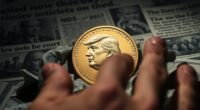As you consider the concept of a Federal Crypto Reserve, think beyond the immediate allure of quick profits. You might find that a focus on long-term economic stability offers a more compelling case. Integrating digital currencies could act as a buffer against inflation and market volatility. But what does this mean for the future of our financial system? The implications could be significant, and they may reshape how we view digital assets altogether.

The concept of a Federal Crypto Reserve is gaining traction as a vital tool for enhancing economic stability in an increasingly digital world. You might wonder why a government would invest in cryptocurrencies like Bitcoin. The answer lies in the potential for economic stability and diversification. By creating a crypto reserve, the government can hedge against monetary instability while integrating digital assets into the financial system. Just as gold serves as a traditional reserve, digital currencies can diversify government holdings, offering a strategic asset that helps maintain financial stability.
One of the standout benefits of a Federal Crypto Reserve is its potential to protect against inflation. Bitcoin, viewed as a deflationary asset, can stabilize the dollar's value during economic stress. When inflation spikes, having a reserve that appreciates in value can be a game-changer. Moreover, the long-term investment horizon associated with crypto means that while short-term volatility may deter some, the long-term prospects could deliver significant rewards. In an age where the global economy faces constant disruption, this kind of strategic foresight is crucial, especially as cybersecurity vulnerabilities continue to threaten financial stability.
Establishing a crypto reserve also encourages the adoption of digital assets within the U.S. financial system. As corporations increasingly embrace cryptocurrencies, your confidence in their value can grow, further enhancing the reserve's worth. A clearer regulatory framework is necessary to manage and regulate these assets effectively, but once established, it could lead to innovations in financial services that align with broader economic objectives. New regulatory framework is essential to embrace cryptocurrencies effectively.
The management and oversight of a crypto reserve would likely fall to agencies like the Federal Reserve and the Treasury. These institutions would ensure secure storage solutions and the proper management of volatility risks associated with cryptocurrencies. By doing so, they could even generate revenue and offset budget deficits, creating a win-win situation for the economy.
Looking at the policy implications, the BITCOIN Act proposes forming a Strategic Bitcoin Reserve to bolster economic stability. This kind of regulatory clarity is essential for distinguishing between securities and commodities, ensuring effective oversight by agencies like the Commodity Futures Trading Commission. A national crypto reserve couldn't only secure property rights but also influence the global financial system's adoption of digital assets.









